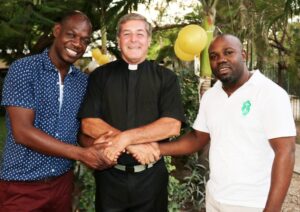Leo Richard Frechette
Credentials
Humanitarian Cause
Healthcare and Food Security, Access to Healthcare, Provision of Medical Services, Healthcare Infrastructure Improvement, Emergency Response, Supporting communities in climate-vulnerable regions
Impact Location
Haiti, Honduras
Occupation
Religious Figure / President and National Director of St Luke Foundation for Haiti and Nph International
Photo Gallery
About
Father Leo Rick Frechette is a Passionist priest renowned for his profound commitment to improving the lives of orphaned children and impoverished communities in Haiti. Combining his religious mission with a dedicated focus on healthcare, he oversees Nuestros Pequeños Hermanos (NPH, or “Our Little Brothers and Sisters”) Haiti’s St. Damien’s Hospital, which provides free medical care to over to over 90,000 children and adults each year. Through his work with Nos Petits Frères et Sœurs (NPFS), the sister organization of NPH, he has significantly impacted the lives of vulnerable populations, emphasizing both spiritual and physical well-being in a country grappling with severe socio-economic challenges.
Born in 1953 in Connecticut, Father Frechette pursued higher education at Assumption College in Massachusetts, where he earned degrees in mathematics and philosophy. His journey in the priesthood began in 1979 when he was ordained as a Passionist priest, with an initial goal focused primarily on spiritual ministry.
Frechette’s commitment to serving children began in 1983, when he met Father William B. Wasson, the founder of NPH. He began his work in Mexico, where he was involved in the care of nearly 1,000 orphaned and abandoned children at a hacienda that had been converted into a home. His passion for service soon drew him to Honduras, where he helped establish a second orphanage for NPH. Frechette’s experiences during this period laid the foundation for his future endeavors, emphasizing the importance of nurturing and caring for vulnerable children.
A pivotal moment in Father Rick’s life came when he was directed by Mother Teresa’s Sisters of Charity to assist in Haiti. There, he encountered a grave situation: babies born to mothers afflicted with AIDS, many of whom did not survive. The needs of these children inspired Frechette and Father Wasson to establish Nos Petits Frères et Sœurs (NPFS, or “Our Little Brothers and Sisters”) in Haiti. This orphanage would become a sanctuary for children amidst a backdrop of political turmoil, economic despair, and rampant violence.
Recognizing the dire health conditions in Haiti, Frechette took the extraordinary step of pursuing medical education. He attended the New York College of Osteopathic Medicine, graduating in 1998 with a Doctor of Osteopathy degree. This decision marked a significant evolution in his role as a priest, allowing him to address the physical health needs of the children under his care.
“There are many children who are invisible to those with money and power and are beyond the capacity of their own families, for understandable reasons. They are living in poverty in countries like this. It’s so important that together we become fathers, mothers, brothers, and sisters to these vulnerable, invisible children, who deserve a place at the table in the family of life.”
As the director of NPH Haiti’s St. Damien Hospital, Frechette oversees an institution that provides free medical services to over 90,000 children and adults annually. The hospital, which serves as a critical resource for the community, offers long-term care for the critically ill and outpatient services. Frechette also manages orphanages like St. Hélène and Father Wasson Angels of Light, which collectively care for more than 2,000 children. His work extends beyond healthcare; he founded the St. Luke Foundation, which focuses on creating dignified jobs and services, including 29 street schools, water delivery to impoverished neighborhoods, and burial services for unclaimed bodies from the morgue.
Frechette’s efforts have garnered recognition, culminating in the 2012 Opus Prize, awarded to unsung heroes tackling significant social issues. His dedication to the children of Haiti and the broader community has made him a respected figure not only within his organization but also on an international scale.
Frechette’s commitment to holistic care is rooted in his belief that treating the whole person is essential, especially in a country like Haiti, where poverty and disease are rampant. He teaches non-physicians to employ methods such as thoracic movement therapy for treating tuberculosis, emphasizing that care goes beyond clinical treatment to encompass emotional and spiritual support. Every day, he interacts with patients, offering companionship and understanding, which he believes can profoundly impact their healing process.
“You have to be disciplined, you have to be good, you have to be positive, and we can get somewhere based on that.”
Throughout his time in Haiti, Frechette has faced formidable challenges, including navigating dangerous situations with armed gangs while advocating for his patients. His reputation as a compassionate leader has afforded him a degree of respect that sometimes provides a shield from the chaos around him. Despite these obstacles, his commitment to fostering a nurturing environment for children remains steadfast. He recognizes the detrimental influences that many young people face in Haiti, from substance abuse to societal cynicism, and works diligently to provide them with hope and opportunities.
As a priest, Frechette does not shy away from the difficult realities of death and dying in Haiti. He conducts many funerals for those who cannot afford proper burial services, utilizing simple yet respectful cardboard coffins. His compassion extends beyond life; he provides dignity and care in death, recognizing the humanity in every individual, regardless of their circumstances.
Father Rick Frechette embodies the spirit of service, demonstrating how one person’s dedication can create ripples of change in the lives of many. His life’s work stands as a testament to the power of compassion and the profound impact of faith in action.

